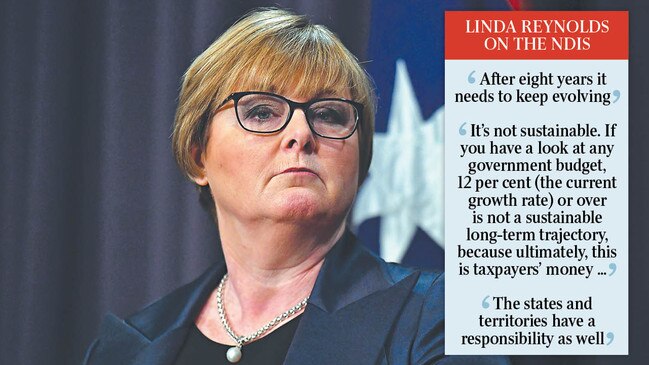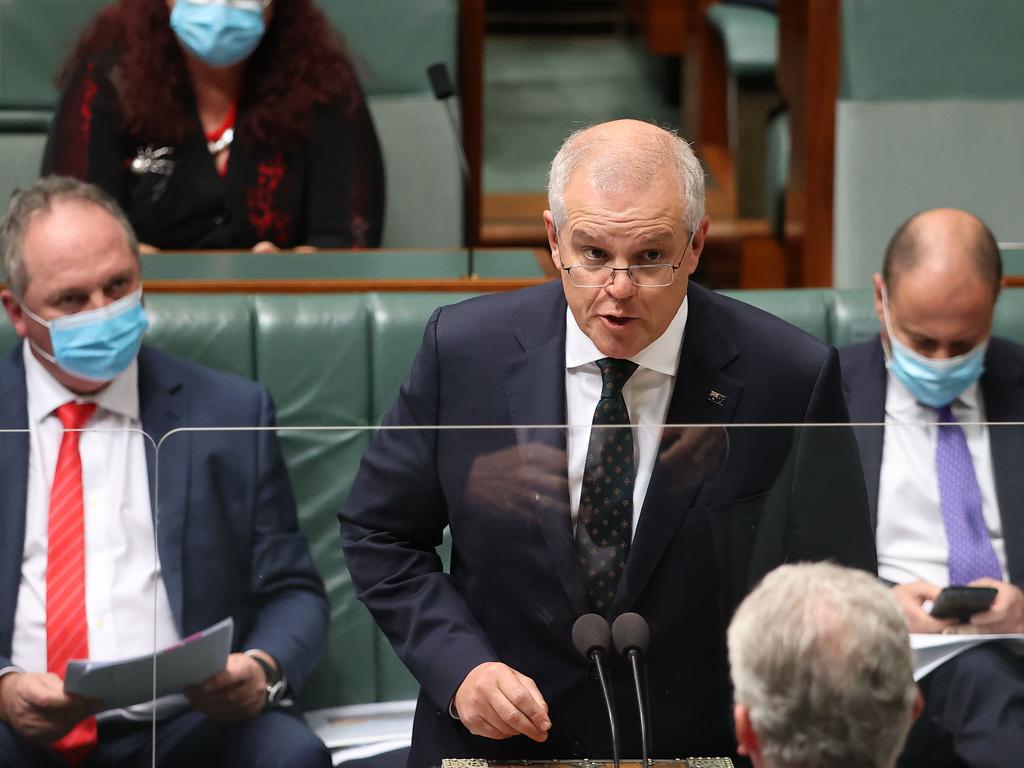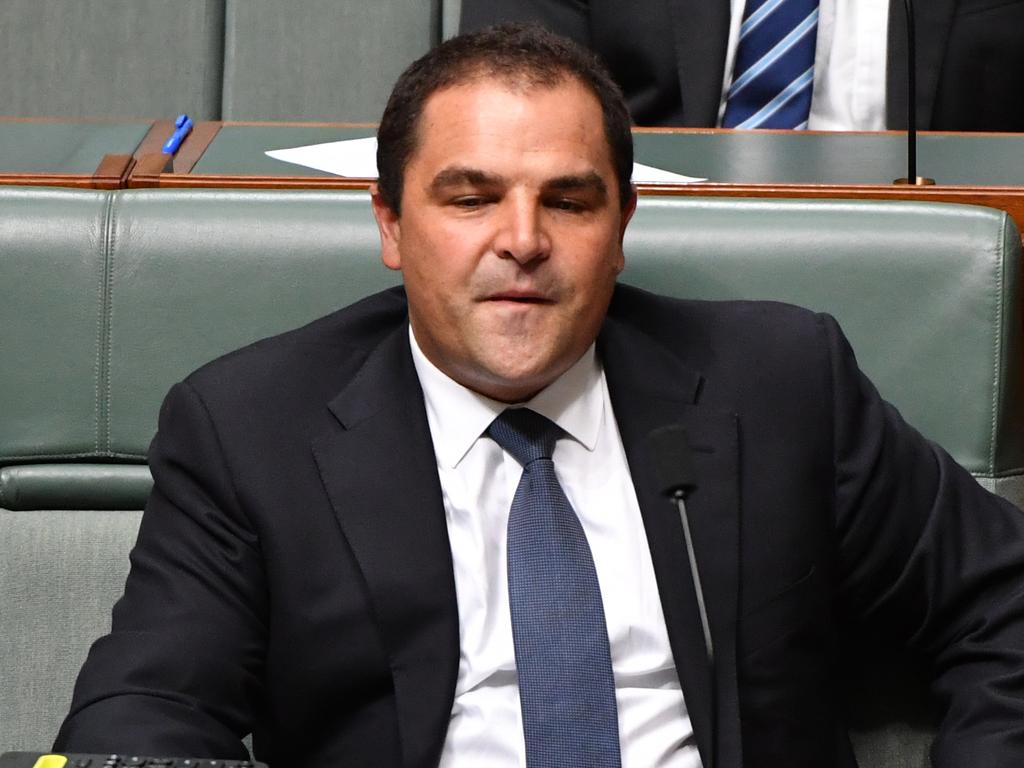States told to share the NDIS load
States and territories will need to take more responsibility for funding the NDIS, with the minister in charge warning that the program was “not sustainable” and never intended to function as a welfare scheme.

States and territories will need to take more responsibility for funding the National Disability Insurance Scheme, with the minister in charge warning that the program was “not sustainable” and never intended to function as a welfare scheme.
NDIS Minister Linda Reynolds told The Australian on Wednesday the original federal-state agreements and funding arrangements for the scheme were based on “very optimistic” projections that did not match reality.
She warned that changes were needed to address the blowout in NDIS funding costs to ensure the scheme could last for generations, declaring that “the states and territories have a responsibility as well”.
“The scheme is an insurance scheme. It’s not a welfare scheme...,” she said. “The key point about this scheme is it is designed to make people more functional.
“...If we succeed then people’s plans will be cut, because they don’t need the same amount of support at that particular time in their life.”
Speaking ahead of a government push to ram through legislation that would allow NDIS chief executive Martin Hoffman to change a recipient’s plan without their permission, Senator Reynolds argued that the bill would “improve the lives of participants”.
Late on Wednesday, Senator Reynolds’ office revealed the new powers for the NDIS chief executive, which have sparked a backlash, had been amended to ensure they could only be used in circumstances where a participant required crisis or emergency funding, a new “minor support” such as a piece of technology or a change to their plan reassessment date.
The new legislation, which sets strict service standards for the NDIS and introduces time limits on decisions made by the NDIA, includes measures recommended by former Finance Department Secretary David Tune’s review of the scheme in 2019.
Senator Reynolds’ comments on funding set up a potential fight with the states, which in July -vetoed a trial of an independent assessment process for NDIS claims. The eligibility of individuals to access funding and the rate of funding were being assessed by government-contracted health professionals rather than on ¬reports submitted by their own medical specialists.
While the NDIS started as a 50-50 financial split between the commonwealth and the state and territory governments combined, the original agreement left the federal share uncapped while the states’ payments were capped at a 4 per cent annual increase.
Funding increases for the states have been lower than the annual cost growth in the scheme, leaving the federal government responsible for 55 per cent of the scheme’s fast-rising costs and on track to fund more than 60 per cent by 2025.
“It’s not sustainable,” Senator Reynolds said. “If you have a look at any government budget, 12 per cent (the current growth rate) or over is not a sustainable long term trajectory, because ultimately, this is taxpayers’ money and like any other government program, the money has to come from somewhere else. This is an issue for all Australians now because what do taxpayers think is a reasonable expenditure? And where does the money come from to fund it?”
Asked if the NDIS was achieving its purpose, Senator Reynolds said: “Absolutely. But after eight years it needs to keep evolving.”
Senator Reynolds said she had spoken multiple times with her state and territory counterparts over the past eight months about how the NDIS could “endure for many generations” while also ensuring ongoing support for those not captured by the scheme.
She said the NDIS was never designed to cover all 4.5 million Australians with a disability and states and territories had historically been largely responsible for supporting individuals not eligible for assistance under the NDIS but who still required help.
“Unfortunately, over time that funding has been withdrawn and so there is more pressure on the NDIS because participants themselves or their families see the NDIS increasingly as what’s been described as an ‘oasis in the desert’,” she said.
Senator Reynolds said an independent report, led by the Victorian government, was due to be delivered to disability ministers next month and would outline the “actuarial data and future -projections” of the scheme’s cost. “We’ll meet in February to discuss the implications of that and really just start having a look at what we think the cost drivers are,” she said. “And then do more work over the course of the next year to look at what some options might be.”
She rejected claims the government was cutting participant supports by stealth and had not been transparent about the modelling underpinning alleged cost blowouts after Labor, the Greens, participants and advocates — including the wife of former deputy prime minister Tim Fischer — questioned the government’s calculations. Senator Reynolds said the December report would rectify a “degree of suspicion” around the rising cost claims.
Labor and the Greens have signalled opposition to key elements of the ¬government’s legislative response to the Tune review.
Greens senator Jordon-Steele John indicated he would oppose the bill while opposition NDIS spokesman, Bill Shorten, ruled out Labor’s vote if the “God powers” were not removed.
Senator Reynolds said “it would be a real shame” if the legislation — the NDIS (Participant Service Guarantee and Other Matters) Bill – failed to pass. “This will improve the lives of participants,” she said.
She said the bill was “absolutely faithful” to the Tune review and its recommendations.
“This bill wasn’t my initiative. This is a bill that the sector has been calling for … But we’ve made most of the changes that the sector wanted,” Senator Reynolds said. “I can’t change the suspicion (surrounding the bill), but what I can say is I’ve listened. We’ve got the legislation here, and how you respond to that now is up to you.”
Also on Senator Reynolds’ agenda is reducing provider fraud, unethical gouging and charging.








To join the conversation, please log in. Don't have an account? Register
Join the conversation, you are commenting as Logout